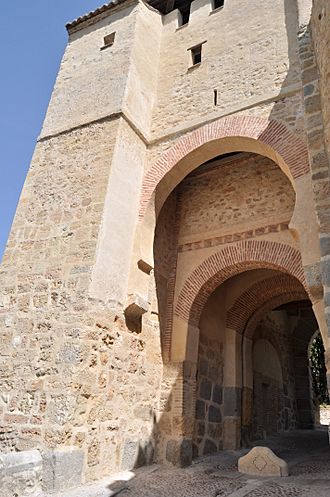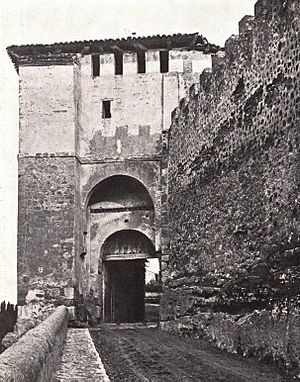Puerta de Santiago (Segovia) facts for kids
Quick facts for kids Puerta de Santiago |
|
|---|---|

West façade of the gate
|
|
| General information | |
| Status | Intact |
| Type | City gate |
| Architectural style | Mudéjar |
| Location | Segovia, Castile and León, Spain |
| Coordinates | 40°57′12″N 4°7′40″W / 40.95333°N 4.12778°W |
| Construction started | c. 13th century |
| Completed | c. 16th–17th centuries |
The Puerta de Santiago is a very old and important gate in the city of Segovia, Spain. Its name means "Gate of Saint James" in Spanish. This gate is a key part of the strong medieval walls that once protected the city. It is a great example of Mudéjar architecture, which mixes Christian and Islamic styles.
Contents
Discovering the Gate of Santiago
The Puerta de Santiago is located right in front of a walking area called paseo de San Juan de la Cruz. It is a big part of the historic walls of Segovia. This gate got its name because it was very close to an old church called Santiago. That church was taken down in 1836.
What the Gate Looks Like
The gate is built in the Mudéjar style. This style makes it look very strong and solid. The bottom part of the gate uses rough stone blocks. One of its most special features is its unique horseshoe arch. This arch opens up to the San Marcos neighborhood. Inside the arch, there is a statue of the Virgin of the Way, but it is quite old and worn.
A Well-Preserved Landmark
The Puerta de Santiago is the best-preserved gate among all the gates in the walls of Segovia. You can see how it has been changed and fixed over many years. The side of the gate that faces west was built around the 13th century. The east side, with its granite blocks and decorative parts, was added much later, in the late 16th and early 17th centuries.
Visiting the Gate Today
Since August 26, 2012, the city of Segovia has offered special guided tours of the gate. These tours happen every Sunday. The gate was carefully restored by the Historical Heritage Foundation of Castile and León. Soon, the inside of the gate will become a puppet museum. It will show puppets from the Francisco Peralta collection.
See also
 In Spanish: Puerta de Santiago (Segovia) para niños
In Spanish: Puerta de Santiago (Segovia) para niños


